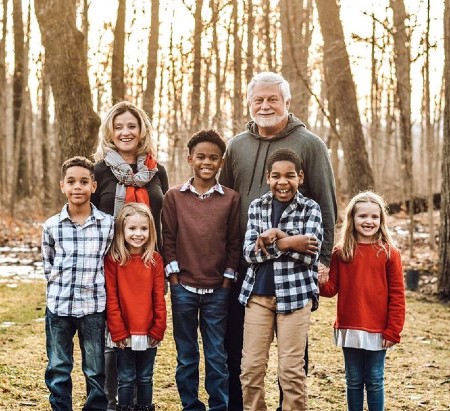Faith & family inspire scholarship gift for civil engineering
Brian and Rachelle Harlow hope to spark change in minority enrollment

Brian and Rachelle Harlow with their grandchildren
Brian Harlow (BSCE '78) and his wife, Rachelle, are establishing new scholarships in the Lyles School of Civil Engineering with a specific focus on African American and underrepresented minority students. The couple was inspired to make this gift commitment in their estate for reasons which reflect their family and their faith.
First and foremost, Rachelle noted they were motived to make a difference for what they saw as low enrollment numbers for African Americans studying engineering at Purdue. They view the issue through the personal lens of future opportunities for their three adopted minority grandsons. "It pulls on our hearts that if they were in another space in life, they would not have the same opportunities," she said.
They also view this through the lens of their Christian faith: "In God's eyes, we are all created equal." With too few African Americans in engineering disciplines, the Harlows want to inspire change. They view the challenge holistically and acknowledge the wide scope of opportunities required to motivate students of all backgrounds to consider engineering and STEM disciplines. This dedicated scholarship is intended to help recruit and support African American and underrepresented minority students to the College of Engineering with the aspiration to see them enter the discipline of civil engineering.
The scholarship support administered by Purdue Research Foundation builds on Purdue's long-term commitment to affordability and accessibility and is also a reflection of their own start at the University. Brian and Rachelle describe their experience starting from modest means. "To be honest, when we went to Purdue—when we lived on Hilltop Drive—we had nothing." Rachelle worked at McDonald's and Brian recalls saying if she could support them for that season, he'd take care of the rest. They have come from a time when they carefully pinched pennies at the grocery store to now being in a position to give generously.
While working on his undergraduate degree, Brian was able to land a part-time role with HNTB and he credits Professor Ron Wukash for his help in lining up the work experience in Indianapolis. While not a formal internship program, Brian enjoyed the opportunity to work for HNTB regularly during the breaks in the academic calendar.
Brian's degree in civil engineering opened up a career opportunity at Chrysler Corporation. Upon graduation, Brian was hired by Chrysler Corporation in Kokomo, Indiana, as a plant engineer beginning a career which would span nearly 40 years. He served in various positions in production, maintenance, quality, manufacturing engineering and product engineering in the Kokomo plants and his final stop in his career included the company's headquarters in Auburn Hills, Michigan, with various leadership roles in manufacturing engineering and operations.
"I suspect there are many other civil engineering alumni who have had the same experience and have benefited from their education at Purdue," Brian said. "I encourage them to think about that. It is important. There are many, many kids out there—of all backgrounds—who would benefit from alumni support. And the benefits accrue to all of society. Society is strengthened. It gets stronger and biases wane. My encouragement is not only to think about it, but also take action. Usually that involves the pocketbook."
When asked what they would hope for as the best possible outcome from their gift, Brian had a special perspective. "I hope that people do not remember the donation. Twenty years from now, I hope that it is forgotten—not because it failed—but because we have succeeded in enrolling a greater number of students." Rachelle added, "We hope this is the spark to get that going."
